Azerbaijani President warns against foreign interference in South Caucasus Emphasizes regional sovereignty
The tragic death of Iranian President Ebrahim Raisi, of course, overshadowed the important event that preceded it - the opening of the Khudafarin and Giz Galasi hydroelectric projects on the Araz River. Nevertheless, it is necessary to note both the significance of this event for the restoration and development of Iranian-Azerbaijani relations and the important political statement made by Azerbaijani President Ilham Aliyev during the event related to the peaceful settlement in the South Caucasus.
“The development of the region must be secured through the will of the peoples living in the countries of the region. The interference of non-regional countries in our affairs is unacceptable. As Azerbaijan, we establish relations with all countries on the basis of mutual respect, non-interference in each other's affairs and mutual benefit, and we will continue to establish them like this in the future. If anyone – leaders of countries thousands of kilometers away from here – want to achieve any results in this region, let them talk to us. Inappropriate and unnecessary intervention has not brought about and will not bring about any results. I believe that Armenia should not take a wrong step. Regional issues should be resolved with the direct participation and determination of regional countries.
For many years, Armenia relied on the protection and support of countries located far from here. What was the result? The result was not very reassuring for them. So, they shouldn’t make yet another mistake. The peoples living in the region have historically lived here. The states of the region are strong states, they are states that conduct an independent policy. No outside force has ever succeeded in influencing the determination of these states, and they will not," Ilham Aliyev said.

The fact that the President of Azerbaijan took the opportunity to speak once again on the issues of peaceful settlement speaks about the urgency of this issue, that it is too early to calm down, fully relying on the constructive course taken by Yerevan.
Indeed, on the one hand, we have often witnessed official Yerevan making contradictory statements, or saying one thing and doing another. On the other hand, there is still the threat of growing internal protests in Armenia with the risk of violent overthrow of the government.
And most importantly, external forces are trying to play on the contradictions between the different vectors of Yerevan's policy, which, while giving Yerevan various perks, at the same time paint tempting pictures of a future imaginary revenge. It is not excluded that in some cases such manipulations can reach a rather crude level, for example, blackmail.
This is especially true of France. One can only guess that the impotent rage of the French only increased after the events in New Caledonia, in which, as we have already written and said many times, official Paris in the person of Interior Minister Gérald Darmanin hastened to accuse Baku. Under these circumstances, it can be assumed that the mad occupant of the Elysee Palace and his ministers will start making new attempts to ignite the fire of war in the South Caucasus.

Therefore, Aliyev's appeal is directed not only to the leadership of Armenia, but also directly to third countries.
It is worth quoting again the following phrase from the President's speech: " If anyone – leaders of countries thousands of kilometers away from here – want to achieve any results in this region, let them talk to us". This phrase encapsulates the essence of the new reality created in the South Caucasus. It is Azerbaijan that has become a key player in the South Caucasus, and it is our country that holds the helm of this complex region. The fact that the Armenian leadership has already realized this is evidenced by its steps towards normalization of relations, which is demonstrated by the ongoing process of border delimitation and demarcation. Pashinyan is never tired of repeating that this process has become a cornerstone for further strengthening Armenia's sovereignty and security.
If you listen to his words, they aim to explain to their citizens a simple thing - the border was not delimited, because Yerevan, by virtue of the occupation of Karabakh, did not recognize the state border of Azerbaijan itself, and non-recognition of the border of a neighboring state is fraught with the risk of the latter drawing a new border wherever it wishes to do so. President Aliyev eloquently reminded the Armenian society of this. Now Pashinyan is trying to explain to his people that the delimitation process that has been initiated excludes such a course of events and thus strengthens Armenia's sovereignty.
As a result, it turns out that the strengthening of Azerbaijan's sovereignty leads to the strengthening of Armenia's sovereignty, generally increasing the international subjectivity of the entire South Caucasus. It is very difficult for some third countries that think they are the world's countries to accept this reality. Our task is to explain them time after time that it is useless to resist this reality, it is unproductive to apply old models to the new world.
I think the peoples of the former and current French colonies will be happy to join us in this campaign.








